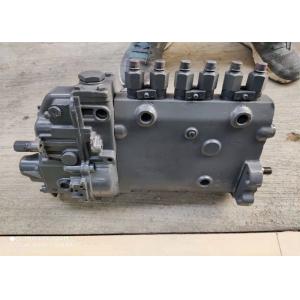6D102-6 Used Fuel Injection Pump For Excavator Diesel Engine 101609-3321 101061-9990
Add to Cart
6D102 - 6 Used Fuel Injection Pump For Excavator PC200 - 6 101609 - 3321 101061 - 9990
Specification
| Car name: Fuel Injection Pump | Model Number: 6D102 - 6 | |
| Quality: High quality | Engine type: Diesel | |
| Application: Excavator | Part code: 101061 - 9990 | |
| Cooling: Water cooling | Injection: Direct | |
Description
4 Common Diesel Fuel Injection Pump Problems
Pressure-Packed Fuel Injection
Today’s diesel fuel injection pumps are under pressure – even more
pressure than what was once considered “normal.” Around 15-20 years
ago, it was common for fuel injector pumps to process fuel in a
system at around 10,000 to 15,000 psi (pounds per square inch). But
that’s only about half of what engines are expected to do today.
Fast-forward to the present day, and those diesel fuel injector
pumps are operating in the 30,000 to 40,000 psi range.
Top-end engine performance is in many ways dictated by how much fuel can be processed by the engine. Basically, a superior engine can process fuel and air better than an average engine – that’s one reason why turbochargers are so effective at increasing horsepower – and a greater internal pressure in a necessity. That helps explain the significant pressure output of today’s fuel injection pumps compared to those from yesteryear.
Problem #1 – Dirty Fuel
A clean diesel fuel pump injector is a happy diesel fuel pump
injector. Over time, residue can build up in the fuel system, and
enough gunk, grime and grease can clog up the entire fuel injector
pump. The spray tip (where the fuel leaves the injector and enters
the combustion chamber) is particularly prone to “backing up,” so
to speak.
If your engine has ever sputtered or hesitated during acceleration, a clogged fuel spray tip might be the glitch. And it all starts with subpar diesel fuel. In 2006, diesel fuel production was tweaked to compensate for ultra low sulfur diesel fuel (ULSD), and diesel engine owners have noticed more “dirty fuel” difficulties than before.
Problem #2 –Low Fuel Tank Level
If your main goal in life was to destroy diesel fuel pump
injectors, you’d run your car with the fuel tank as close to empty
as possible. It all has to do with lubrication. With plenty of
diesel fuel in the tank, the fuel pump bearings receive plenty of
lubrication. With a near-empty tank, the fuel system is suddenly
pushing air instead of diesel fuel. Anything but diesel fuel can
wear out the fuel pump bearings, which means the fuel injectors
will not receive the fuel at the pressurized level (30,000 psi,
40,000 psi, etc.) it should be.



